Understanding Prebuilt Gaming PCs: Advantages & Insights
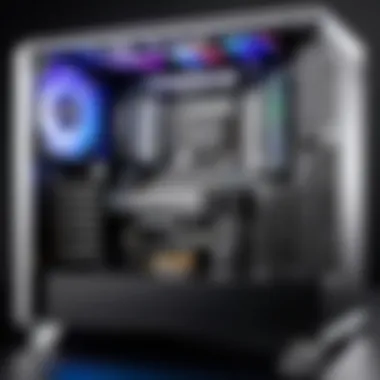
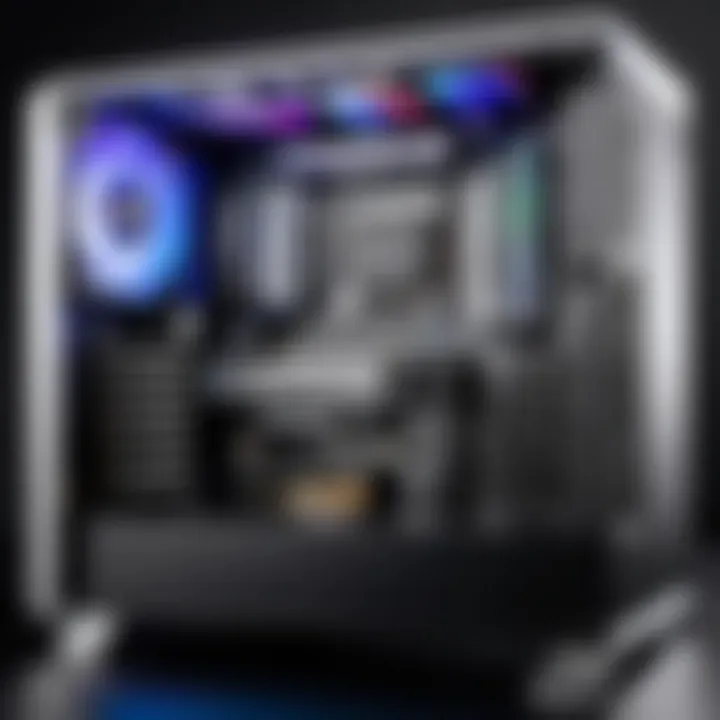
Intro
In recent years, prebuilt gaming PCs have gained significant popularity among gamers and tech enthusiasts. This trend can be attributed to the increasing demand for high-performance systems that deliver excellent gaming experiences without the complexities of custom building. Understanding what a prebuilt gaming PC is, requires looking at its components, advantages, and how it compares to custom builds.
A prebuilt gaming PC is a fully assembled computer that is designed specifically for gaming. These systems come ready to use right out of the box and are typically manufactured by companies such as Dell, HP, and Alienware. Each unit combines hardware components like the processor, graphics card, memory, and storage to optimize gaming performance while taking design and aesthetics into account.
Highlighting its design, these computers often feature sleek cases with customizable lighting and arrangements focused on airflow. The primary goal is to facilitate better cooling and reduce noise during intense gaming sessions.
Key Elements of Prebuilt Gaming PCs
The key to understanding prebuilt gaming PCs lies in their components. Each system usually includes:
- CPU: Often comes with high-performance processors like Intel Core or AMD Ryzen.
- GPU: Dedicated graphics cards, such as NVIDIA GeForce or AMD Radeon, are crucial for gaming quality.
- RAM: Generally equipped with 16GB or more, ensuring smooth multitasking.
- Storage: Combinations of SSDs and HDDs optimize loading times and storage capacity.
By focusing on these aspects, prebuilt gaming PCs cater to a range of user preferences, ensuring that they meet the varying demands of modern gaming.
Pricing
When it comes to pricing, prebuilt gaming PCs can vary widely. Factors such as specifications, brand reputation, and additional features contribute to the overall cost. The typical range can start from around $700 for entry-level models to over $2000 for high-end systems. The price often reflects not only the hardware specifications but also manufacturer support and warranty options available.
"Investing in a prebuilt gaming PC can save users time and provide better access to support and warranties, which are essential for maintaining system performance."
Understanding these elements helps identify the overall value this type of system brings to gamers and tech enthusiasts alike.
Intro to Prebuilt Gaming PCs
The world of gaming has evolved significantly over the years, and prebuilt gaming PCs have become a significant part of this evolution. Understanding the nature of prebuilt gaming PCs is crucial for gamers and tech enthusiasts alike. This section aims to clarify what these systems are while discussing their relevance in today's gaming ecosystem. The advancements in technology and the rising demand for convenience have transformed how gamers approach their setups. Many are now opting for prebuilt alternatives, recognizing the advantages they bring.
Defining Prebuilt Gaming PCs
Prebuilt gaming PCs are fully assembled desktop computers, designed specifically for gaming out of the box. Unlike custom-built PCs, which require individual components to be sourced and assembled, prebuilt systems come ready to use. This means that the consumer does not need in-depth technical knowledge to enjoy high-performance gaming. Structured to provide optimal gaming experiences, these machines typically feature robust hardware configurations that include powerful CPUs, high-quality GPUs, adequate RAM, and sufficient storage.
Additionally, prebuilt gaming PCs are often tested for compatibility and performance. As a result, they usually provide an assurance of quality that appeals to newcomers in the gaming community. However, it is important to note that while convenience is a significant selling point, it is essential to choose a reputable manufacturer for reliability and support.
Historical Context
The concept of prebuilt gaming PCs emerged alongside the growing popularity of PC gaming itself. In the 1990s, gamers faced limited choices. Most had to build their own systems, which required understanding both hardware and software intricacies. This changed over time as companies like Dell and HP recognized the market's demand for ready-made machines. By the early 2000s, specialized companies such as Alienware began offering high-performance gaming computers, setting a standard in the industry.
With technological advancements and the rise of esports in the 2010s, the demand for powerful and easily accessible gaming systems surged. Gamers sought performance but also convenience. Prebuilt gaming PCs started to gain momentum as a viable option. Today, they represent a balanced solution for both casual and competitive gamers, allowing users to skip the often daunting assembly process.
"Prebuilt gaming PCs serve a vital role in making high-performance gaming accessible to a wider audience. Their significance in today's gaming landscape cannot be overstated."
Key Components of Prebuilt Gaming PCs
Understanding the key components of prebuilt gaming PCs is pivotal for anyone interested in these systems. Each element plays a significant role in both performance and overall user experience. Knowing how these parts interact helps consumers make informed decisions when choosing a prebuilt gaming PC.
Central Processing Unit (CPU)
The Central Processing Unit, or CPU, is often regarded as the brain of the gaming PC. Its function is to process instructions and manage data. The CPU affects your gaming experience, influencing everything from frame rates to responsiveness. A powerful CPU helps in minimizing bottlenecks, particularly in CPU-intensive games like strategy or simulation titles.
Modern prebuilt systems tend to feature CPUs from recognized brands such as Intel and AMD. Options like the Intel Core i7 or the AMD Ryzen 7 are common in mid to high-end builds. Selecting the right CPU is essential, as it impacts game performance and multitasking. A model with more cores and threads can manage complex applications better, a point worth considering for gamers who engage in streaming or video editing.
Graphics Processing Unit (GPU)
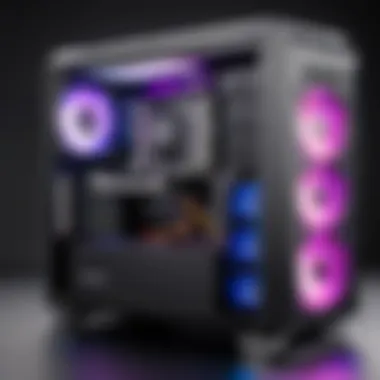
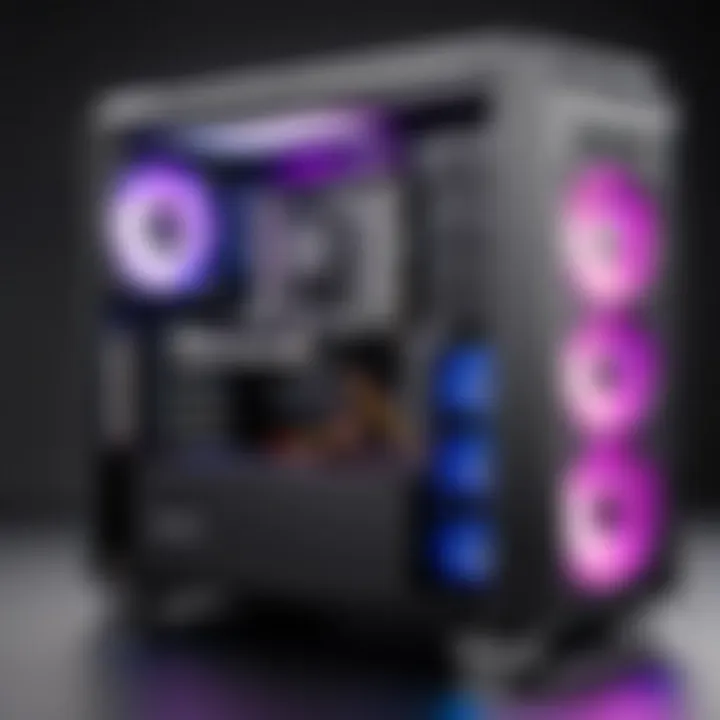
The Graphics Processing Unit, or GPU, is critical for rendering graphics in games. Most gamers prioritize the GPU above all other components because it directly affects visual fidelity and frame rates. High-end GPUs, such as the NVIDIA GeForce RTX 3080 or the AMD Radeon RX 6800 XT, can handle demanding games at high resolutions and settings.
Paying attention to the GPU is crucial while selecting a prebuilt gaming PC. The market is constantly evolving, with newer models offering advanced features like ray tracing. A capable GPU enhances the overall gaming experience, making it vital to balance the CPU and GPU for optimal performance.
Motherboard and RAM
The motherboard serves as the main circuit board in a prebuilt gaming PC, linking all components together. Selecting a compatible motherboard is key, as it must support the CPU, GPU, and other components. Models vary by size and features, such as additional slots for RAM or upgrade options.
Random Access Memory, or RAM, also plays an essential role in gaming. It temporarily stores data that is in use, allowing for faster access. Generally, 16GB of RAM is considered adequate for most gamers today, though higher amounts are becoming more common in premium prebuilt systems. Investing in a motherboard with both capacity and expansion potential allows gamers to upgrade their systems easily in the future.
Storage Options
When it comes to storage, prebuilt gaming PCs often provide two main types: Hard Disk Drives (HDD) and Solid State Drives (SSD). SSDs are increasingly preferred due to their faster data access speeds. A gaming PC with an SSD can reduce boot times and load times for games, leading to a more seamless experience. Models like the Samsung 970 EVO are popular for their speed and reliability.
On the other hand, HDDs provide larger storage capacities at a lower price point. They can be ideal for storing games that do not require the fastest load times or for housing multimedia files. A common setup in prebuilt systems includes a combination of both an SSD for the OS and key games, supplemented by an HDD for additional storage.
In short, the key components of prebuilt gaming PCs intertwine to create a system that can handle modern gaming demands efficiently. Understanding their roles not only helps make a better purchasing decision but can also enhance overall satisfaction with the gaming experience.
Benefits of Prebuilt Gaming PCs
Prebuilt gaming PCs present various advantages that appeal to different segments of the gaming community. These advantages extend beyond mere convenience and touch on aspects of performance, support, and value. By exploring the benefits, potential buyers can make informed choices that align with their gaming needs.
Convenience and Time Savings
For many users, convenience stands as a significant factor when considering a prebuilt gaming PC. The appeal lies in the ease of having a fully assembled system ready for immediate use. No need to worry about selecting compatible components or assembling them. For those with busy schedules or less technical expertise, this can be a game-changer.
Additionally, prebuilt systems often come with software pre-installed, meaning users can start gaming shortly after unboxing their purchase. This aspect saves hours, if not days, that may be spent in researching parts, building the system, and troubleshooting initial setups. The overall timeframe from purchase to gameplay is notably shorter, which is an appealing feature for many.
Warranty and Support
Another critical element of prebuilt gaming PCs is the warranty and customer support offered by manufacturers and retailers. Unlike custom-built PCs, which typically rely on the individual to manage parts warranties separately, prebuilt systems often come with a unified warranty covering the complete machine. This can offer peace of mind to buyers who may fear technical issues.
For example, brands like Alienware and HP provide extensive support options, including online chat and phone services. This assistance can be invaluable when users face problems, as they can rely on professional help rather than relying on online forums. Such support allows users to address any technical concerns promptly, ensuring that gaming experiences are uninterrupted unless absolutely necessary.
Optimized Performance
When it comes to performance, prebuilt gaming PCs frequently come tailored for specific gaming needs. Intended for gamers who want to enjoy their titles without stress about hardware compatibility, these systems seek to offer optimized configurations. They are often built with high-performance components that are carefully selected to work well together.
Manufacturers leverage their expertise to ensure that combinations of CPUs and GPUs deliver the best possible gaming experience. In some cases, systems may feature overclocked components pre-tuned for maximum performance out of the box. The knowledge behind these choices results in a level of assurance that the setup will perform reliably.
"Investing in a prebuilt gaming PC can save time and reduce the learning curve associated with building your own system."
Drawbacks of Prebuilt Gaming PCs
Prebuilt gaming PCs offer several advantages, yet it is essential to understand their drawbacks as well. Recognizing these downsides allows consumers to make informed choices tailored to their specific needs and preferences. The main disadvantages include higher price points, limited customization options, and the potential for over-preconfigured parts. Each of these elements will be examined in detail below.
Higher Price Point
One of the primary drawbacks of prebuilt gaming PCs is their higher price point compared to custom builds. Individuals who choose to buy preassembled systems may find themselves spending more for components they could acquire individually at lower costs. The pricing often reflects the convenience of purchasing a ready-to-use product rather than the actual value of its parts.
Many factors influence the cost. Vendors generally include not just hardware, but also labor and warranty costs in the price of the prebuilt system. Furthermore, brand reputation plays a significant role; leading brands like Alienware or ASUS tend to charge a premium for their products. Some users end up paying considerably for aesthetics or branding instead of performance.
Higher prices mean that gamers on a tighter budget might face challenges when trying to find a system that meets both their gaming needs and financial constraints. A clear understanding of the price differences between prebuilt and custom options can aid consumers in budgeting effectively for their next gaming rig.
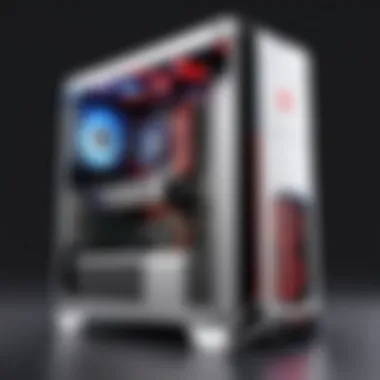
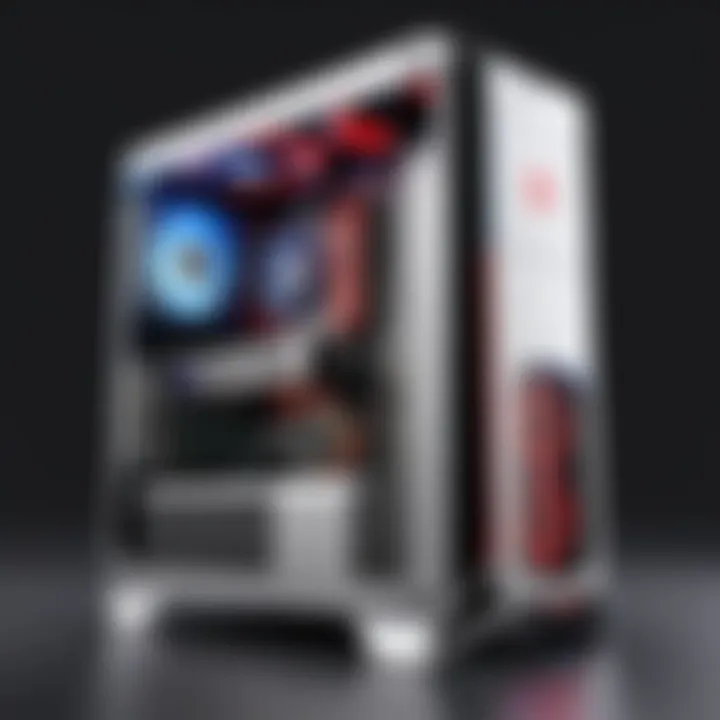
Limited Customization Options
Another notable limitation of prebuilt gaming PCs is the restriction on customization. When buying these systems, users often find themselves with a fixed configuration, which may not fully cater to their unique preferences or gaming requirements. While some manufacturers allow minor upgrades post-purchase, these options can be inadequate for those looking for a tailored setup.
For example, casual gamers may not require high-end components, and they would prefer a lower-cost entry-level GPU. In contrast, competitive gamers often seek powerful graphics cards and enhanced cooling systems for optimal performance. The inability to design a PC that caters specifically to varying needs can lead to frustration and dissatisfaction among users.
Choosing to build a custom PC enables individuals to handpick each component according to their preferences. This process fosters a sense of ownership and control over the final product, something that simply cannot be matched with most prebuilt options.
Potential for Over-Preconfigured Parts
Another aspect to consider is that some prebuilt systems utilize over-preconfigured parts, which do not always align with the user’s needs. This might include components that are unnecessarily powerful or outdated. Manufacturers often bundle parts together to keep costs down, but this can lead to a performance mismatch in the overall system.
For instance, a gaming PC could feature a high-end CPU that is capable of handling the most demanding tasks while being paired with a lower-tier GPU. Such disparity results in an unbalanced system that may not perform as expected in gaming scenarios. Additionally, some parts may not be easily upgradeable, creating further limitations for users who wish to enhance their systems in the future.
Over-preconfiguring parts can also lead to wasted features. Gamers might pay for advanced cooling systems or RGB lighting in a system designed for casual use. If a user is primarily playing lighter games, investing in high-performance cooling may be unnecessary and economically imprudent.
In summary, while prebuilt gaming PCs offer convenience and ready-to-use functionality, they come with notable drawbacks that must be weighed against their benefits. Understanding the higher price points, limited customization options, and potential for over-preconfigured parts will help consumers navigate their gaming PC choices more effectively.
Target Audience for Prebuilt Gaming PCs
Understanding the target audience for prebuilt gaming PCs is essential in comprehending their market dynamics and variations in user needs. Different groups have distinct preferences that influence their choices. Thus, knowing these audiences helps manufacturers tailor their products accordingly. This section outlines the specific demographics driving the demand for prebuilt systems and what they seek in performance, aesthetics, and usability.
Casual Gamers
Casual gamers typically engage in gaming for leisure rather than competition. Their requirements differ from more intense users. They often prioritize ease of use, affordability, and general performance in popular games. Prebuilt gaming PCs provide a straightforward solution. These systems are ready to play, require no technical knowledge for assembly, and often come with essential software pre-installed.
Many casual gamers look for an enjoyable experience without the hassle of tweaking settings or optimizing performance. They often value versatile systems that can handle various tasks, not just gaming. For this audience, brands like Dell with their Alienware line, or HP's Omen, offer appealing options.
Competitive Gamers
On the other hand, competitive gamers need high-performance systems that support fast-paced gameplay. They require fast refresh rates, advanced cooling systems, and superior graphics capabilities. Prebuilt gaming PCs aimed at this crowd often feature high-end GPUs from Nvidia and powerful CPUs from AMD. Brands such as ASUS and MSI cater to this segment.
Competitive gamers may still prefer prebuilt rigs due to the fine-tuned configurations these systems offer. The balance of processing speed and graphical output is vital for competitive environments. Furthermore, the reliability of prebuilt systems ensures they deliver consistent performance during tournaments or online matches.
Individuals New to Gaming
Newcomers to the gaming world present another important market segment. These individuals may not be aware of hardware specifications or the intricacies of building a PC from scratch. For them, prebuilt systems offer simplicity. They eliminate the overwhelming decision-making process associated with custom building.
Companies like CyberPowerPC and iBUYPOWER target this audience by offering entry-level systems that perform well without breaking the bank. Marketing efforts often emphasize plug-and-play capabilities, customer support, and guaranteed compatibility. This helps ease the transition into gaming for newcomers.
Prebuilt gaming PCs have found their place in the market due to their ability to meet diverse user needs efficiently. Whether catering to casual players, competitive enthusiasts, or novices, they offer varied solutions that address performance, usability, and reliability.
In summary, recognizing these target audiences is crucial. It allows manufacturers to create products that fulfill specific desires and requirements. This segmentation fosters growth in the prebuilt gaming PC market, catering to a broad range of gaming enthusiasts.
Market Trends and Developments
In the fast-evolving world of gaming, prebuilt gaming PCs occupy a unique position. Understanding market trends and developments is crucial for several reasons. First, it offers insights into whether these PCs can meet current and future gamer needs. As the landscape shifts due to new technologies and cultural changes, prebuilt gaming PCs must keep pace. This section will explore three significant trends with deep analysis.
Rise of E-Sports
E-sports have become a massive industry, attracting millions of viewers worldwide. This rise has driven demand for high-performance gaming rigs suitable for both players and fans. Prebuilt gaming PCs are particularly appealing in this context. They provide powerful specs without the hassle of assembling a custom setup.
Many companies design their systems with a focus on peak performance and aesthetic appeal to attract serious gamers. Features such as RGB lighting and solid cooling solutions are now commonplace. This focus on aesthetic alongside performance can sway a buyer’s decision toward buying prebuilt.
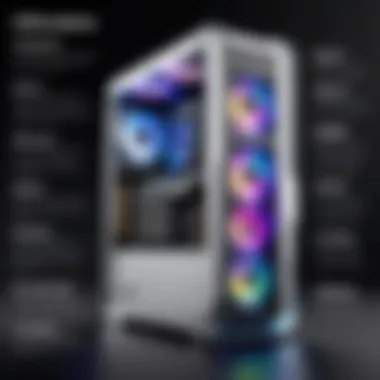
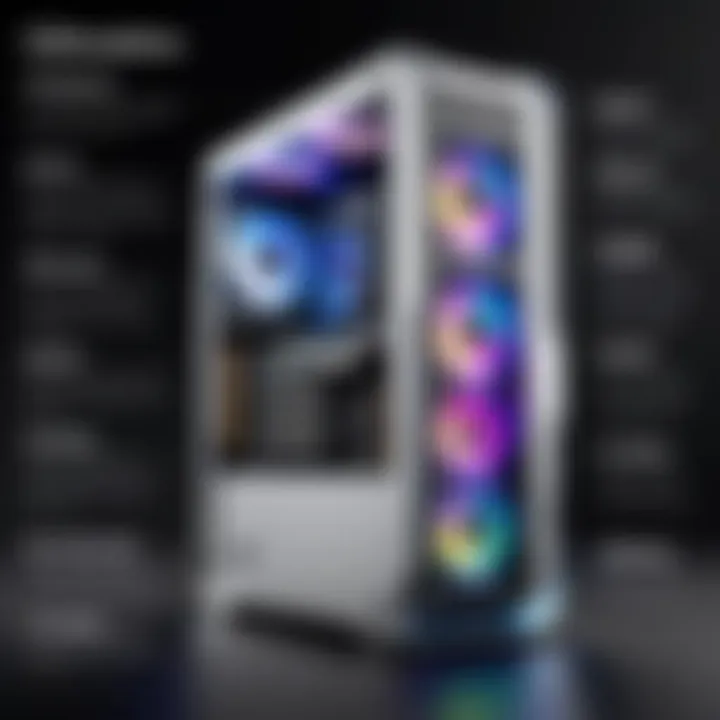
In summary, the rise of e-sports isn't just a trend; it's influencing how gaming PCs are designed. The allure and excitement surrounding competitive gaming have led many to opt for convenient, high-performance systems that prebuilt options offer.
Advancements in Technology
Technology advances at an alarming rate each year. We see new hardware innovations that enhance gaming experience continuously. These include faster CPUs, improved GPUs, and more efficient cooling systems. Prebuilt gaming PCs often benefit from these advancements faster than custom builds due to rapid production cycles. Companies updating their systems means gamers get access to the latest technology sooner.
Furthermore, developments in performance monitoring software and optimization tools are integrating into these machines. Builders are focusing on user-friendly software that can enhance gaming experience without requiring extensive technical knowledge from users. This tech leap not only improves gameplay but also boosts overall satisfaction for consumers who prefer convenience.
Changing Consumer Preferences
As the gaming audience broadens, so do preferences in how people acquire their equipment. Some gamers still prefer the freedom that custom builds provide, but many find prebuilt PCs more suited to their lifestyle. This shift is especially evident among younger gamers who prioritize speed and ease of use.
Factors influencing consumer preference include:
- Shifts towards online shopping: More consumers prefer to purchase items quickly online rather than visiting stores.
- Social Media Influence: Gamers often refer to influencers and communities to decide on a brand or product.
- Brand Loyalty: Many people now gravitate towards trusted brands offering reliability over obscure options.
All of these factors mean prebuilt gaming PCs serve a larger audience. By simplifying the buying process while ensuring performance, manufacturers can meet these changing demands effectively.
"The gaming hardware market is no longer just about tech specs; it’s about understanding the gamer lifestyle and preferences."
Comparing Prebuilt and Custom Gaming PCs
When evaluating the landscape of gaming hardware, the comparison between prebuilt and custom gaming PCs emerges as a vital subject. This section delineates the distinctive attributes each type of PC brings to the table. It also examines the interplay between cost, performance, and user experience. Understanding these factors is essential for potential buyers looking to make informed choices based on their preferences, budget, and gaming goals.
Cost Analysis
Cost is often one of the most significant factors in deciding between prebuilt and custom gaming PCs. Generally, prebuilt systems can be more expensive up front compared to their custom-built counterparts. For example, a prebuilt system from Alienware or MSI might include a premium for brand reputation and packaging. On the other hand, custom builds often allow enthusiasts to allocate funds more efficiently. They can choose specific components that fit their budget without unnecessary extras that come pre-installed in many prebuilt options.
"The cost of a gaming PC can vary dramatically based on your choices."
When considering a custom option, potential buyers can easily accommodate desires through online research. This enables them to pick and choose parts that perfectly fit their budget and performance needs. However, there are some extra costs, such as tools or hiring an expert to assemble parts, that might offset initial savings. Ultimately, the decision on cost often hinges on individual circumstances and preferences.
Performance Metrics
Performance metrics serve as another area of comparison between prebuilt and custom gaming PCs. Prebuilt systems typically arrive with pre-selected combinations of components that vendors guarantee to work well together. Companies like Dell and Lenovo often focus on optimal performance within their product lines. However, this does not guarantee that every gamer will find such setups suitable for their unique needs.
Custom setups allow gamers to prioritize specific performance parameters like frame rates or resolution capabilities. Gamers assembling their own systems can select GPUs, CPUs, and cooling systems that align with how they use their machines, whether for casual gaming or resource-heavy AAA titles.
Moreover, performance tests can differ between the two types of systems. Users may reference benchmarks from websites like en.wikipedia.org or reddit.com to compare real-world usage data. Such comparisons help gameplay experience understanding beyond just specifications.
User Experience
User experience encompasses usability, aesthetics, and setup. Prebuilt gaming PCs generally come with a convenient setup right out of the box. Users typically experience a smooth first interaction. They have systems built and configured, which may reduce initial frustration for newcomers to gaming.
Conversely, custom-built systems can come with a learning curve. The assembly process can be rewarding but may intimidate those who lack experience in building PCs. A custom setup also provides a chance for personalized aesthetics, as users can select case designs, RGB lighting, and cooling solutions that reflect their style.
Finale
In this article, we have outlined the multifaceted aspects of prebuilt gaming PCs. These systems represent a pivotal evolution in the gaming hardware market, merging convenience with performance. They cater to a variety of users, from casual gamers to serious enthusiasts. The assembled nature of prebuilt systems allows users to dive directly into gaming without the upfront complexity of building a custom rig.
Summary of Key Points
- Definition and Historical Context: Prebuilt gaming PCs are factory-assembled systems tailored for gaming. They emerged as a response to the increasing demand for user-friendly gaming solutions, reflecting the expansion of the gaming industry.
- Key Components: A typical prebuilt gaming PC includes essential parts like a CPU, GPU, motherboard, RAM, and storage options. These components are often selected for their compatibility and performance, ensuring an optimal gaming experience.
- Benefits and Drawbacks: While prebuilt systems offer time savings and warranty advantages, they often come at a higher price. Customization options may also be limited, which could be restrictive for certain users.
- Target Audience and Market Trends: With a rise in e-sports and technological advancements, prebuilt gaming PCs are catering to diverse audiences, including competitive gamers and those new to gaming. The industry is shifting towards providing more accessible and optimized gaming solutions, aligning with changing consumer preferences.
Future Outlook
The landscape of prebuilt gaming PCs is poised for further evolution. Innovations in hardware technology will likely enhance performance while reducing costs, making high-end gaming experiences more accessible. Moreover, as remote work and gaming continue to converge, the demand for prebuilt systems may grow even more. Companies may begin to incorporate more customizable options into their offerings, aligning with the desire of gamers for personalization.
In summary, prebuilt gaming PCs offer a distinctive advantage in today’s market. They streamline the entry process for new gamers and accommodate seasoned enthusiasts. As technology continues to advance, the role these systems play will become even more significant.







